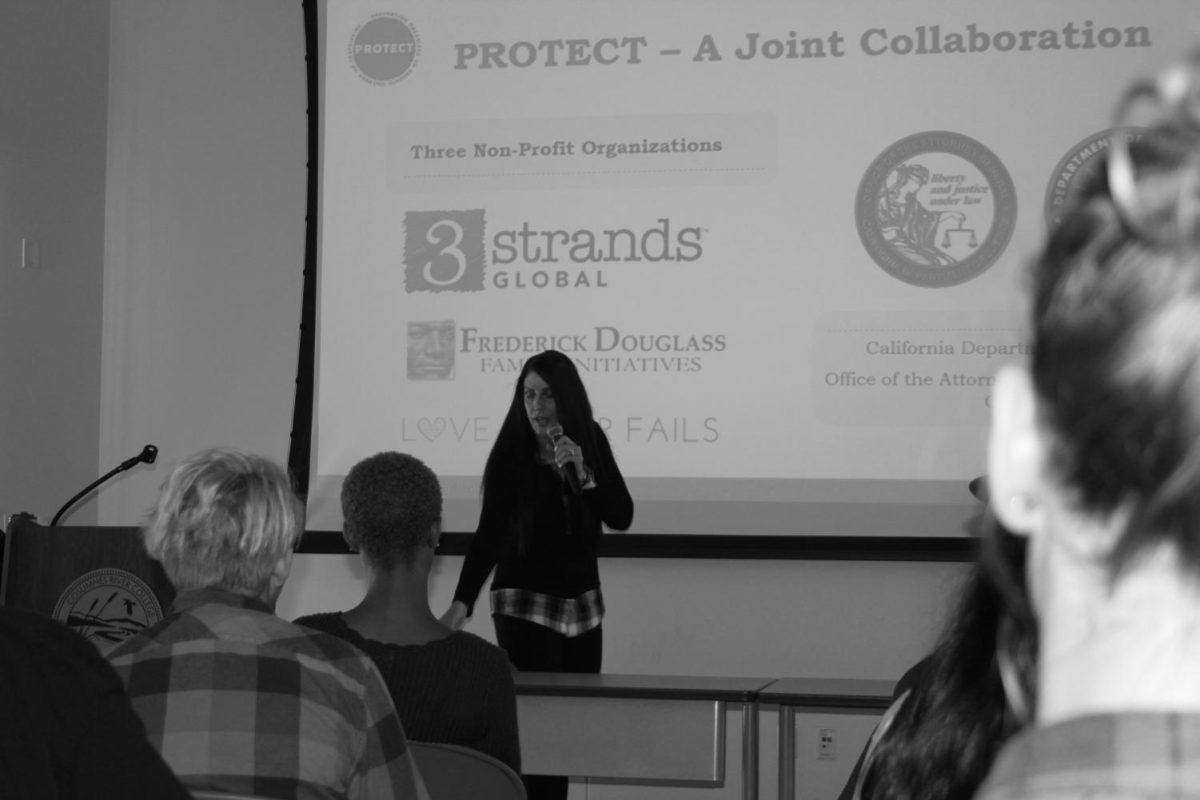Guest speaker informs students about human trafficking
3Strands Global spokesperson Melissa Zapata gives a speech about human trafficking to a group of people in the WINN Center.
Spokesperson Melissa Zapata came to Cosumnes River College to inform a crowd of about 100 people about the dangers of human trafficking.
The seminar on Sept. 13, covered the fast growing criminal business that is human trafficking. According to the Webster Dictionary, human trafficking is the action or practice of illegally transporting people from one country or area to another, typically for the purposes of forced labour or commercial sexual exploitation.
“Human trafficking is a $150 billion dollar business. Not only does it include sex trafficking but it also involves labor extortion which by definition is a form of modern-day slavery in which individuals perform labor or services through the use of force, fraud, or coercion,” said Zapata.
Zapata comes from a local organization called 3Strands Global which aids victims and fights against human trafficking. With its program PROTECT (PRevention Organized To Educate Children On Trafficking), their goal is to inform and teach about the signs of labor and sex trafficking to schools in California.
“PROTECT is our curriculum and that’s teaching prevention, to educate kids on trafficking, even for college,” said Zapata.
The PROTECT curriculum is taught mostly at elementary, middle and high schools starting from Grade five to Grade 11. Occasionally, it is brought to colleges, Zapata said, including in the local area where she has spoken at Sierra College and Sac State.
Currently, Sacramento is rated No. 2 in California for Human Trafficking per capita. Los Angeles is rated No.1, and in the country California is No.1 nationwide in most trafficking per capita. Zapata said the recorded statistics could be higher since 70 percent of all trafficking crimes are not reported, according to 3Strands Global.
Professional Development Center Coordinator and Communication Studies Professor Georgine Hodgkinson said this seminar was part of a campus-wide lecture series.
“It gives an opportunity to talk about social issues that have impact,” Hodgkinson said.
Rachael Browe, a sociology professor, brought her class to this event.
“Its unpleasant, important and difficult to talk about but the awareness alone can have impact,” Browne said.
Since social media plays an important part in the recruitment and selling of victims, Zapata urged all social media users to be mindful of what they share with others on their news feeds as well as urging others to to look out for one another while out with friends.
Students like Dylan McClellan, a 25-year-old computer science major, said that they were surprised by what they learned from the lecture.
“Most people don’t know a lot about this topic,” McClellan said.
Avery Anderson, 24, a communications major, that attended the lecture knew about the dangers of human trafficking and had a different reaction to the lecture.
“I think it’s really cool that they are starting to implement this curriculum,” Anderson said. “I was fortunate enough that my parents taught me how to be safe, I know that a lot of people don’t have the same.”

